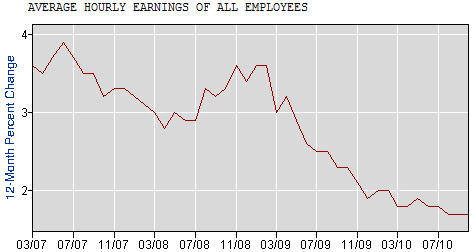Many folks are fearful of inflation and convinced that we have inflation because the prices of three key commodities are going up: Gas, food and health care. These happen to be things we all need and we are very sensitive to their prices.
It is indeed harder for us to get by because of these isolated commodity increases, but they are not indicitive of inflation in the broad economy. (That is why food and gas go up but there is no COLA for social security. This suggests a different way of figuring COLAs, but that's another topic.)
Inflation is a
broad phenomenon in an economy. It.is the sum of all price/asset action. If you bought a tank of gas this week you paid a few dollars more. If you bought a house this week you paid 50, 100, 200 thousand dollars less. Nationally, all housing is down including rent. (Some rents go up in some areas but paces like Florida and Nevada are still part of America and the average price action is flat or down.)
And there is one thing you can buy that is definitely cheaper than it was:
the labor of a human being. Most of us are on the worker side, not the employer side, so we do not see our flat or declining wages in terms of inflation/deflation. But the price of the commodity that we have to sell (our labor) is not skyrocketing!
In the big picture, the only picture that matters for things like national monetary policy, we are not experiencing inflation and are in ongoing danger of slipping into deflation.
Deflation is like jobs... we can have positive job growth while actually slipping further back because the economy needs to create about 150K jobs/month just to stay in the same place. Similarly, we can have effective deflation while nominal inflation is technically positive. Anything under 2% inflation represents slipping backward. (The Federal Reserve minimum inflation target is 2% and we are unable to hit it despite the Feds massive efforts to do so. And the Fed is normally a very anti-inflation institution.)
November 5, 2010, 12:00 pm
Wages And The Slide Toward Deflation
PAUL KRUGMAN
I get a fair number of comments to the effect that worries about deflation are all wrong, look at commodity prices. I�ve tried in the past to explain why we should focus on sluggish, sticky prices, not volatile prices like commodities � hence core inflation. But let me add another point: arguably the stickiest, sluggishiest prices are those of labor. So why not focus on wages?
There are, in practice, some problems with doing this, involving composition effects, overtime, etc.. But still, if you want another indicator of the big slide in underlying inflation, look at average hourly wages:
 http://krugman.blogs.nytimes.com/2010/11/05/wages-and-the-slide-toward-deflation/
http://krugman.blogs.nytimes.com/2010/11/05/wages-and-the-slide-toward-deflation/